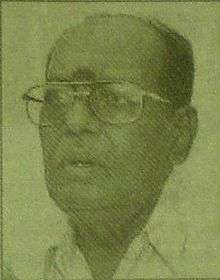B. A. Chidambaranath
| B. A. Chidambaranathan | |
|---|---|
 | |
| Background information | |
| Born |
October 13, 1924 Nagercoil, Travancore |
| Died |
August 31, 2007 (aged 82) Chennai, India |
| Occupation(s) | Music director, professor, playback singer |
| Instruments | Harmonium, Vocals, Violin, Mridangam, Kanjira |
| Years active | 1948–1974 |
Bhoothapandi Annavi Chidambaranathan (13 October 1924 - 31 August 2007) was an Indian film score composer and musician who worked mainly in Malayalam films.
Biography
Hailing from a family of reputed musicians from Nagercoil in Kanyakumari district of Travancore (now Tamil Nadu, India), Chidambaranathan took early lessons in mridangam and Carnatic vocal from his father, B. K. Arunachalam Annavi. He also took training for sometime under Muttiah Bhagavathar and used to play mridangam for him at his concerts. He then learnt the violin first under Nagamani Marthanda Nadar and then for seven years under the Kumbakonam Rajamanickam Pillai. Chidmabranathan was noticed by music director C. N. Pandurangan, when he was playing violin at a concert of M. M. Dandapani Desikar.
His film career began in 1948 when he assisited Pandurangan for the Tamil films Gokuladasi and Jnanasoundari. He debuted in Malayalam with Vellinakshathram, the first film of Udaya Studios. He had also scored a Sinhalese film before his entry into Malayalam. After scoring the film Sthree (1950), his third film as a composer, Chidambaranathan took a sabaticcal and did not contribute to film music for 14 years. He joined All India Radio and worked for their musical productions and conducted his own concerts during this time. It was P. Bhaskaran who brought him back to film scoring. It was during this phase, which saw him score the music for 14 films, beginning with Rajamalli (1964), that Chidambaranathan made his presence felt. His magnum opus Murappennu was released in 1965. Songs like "Karayunno Puzha Chirikkunno" and "Kadavathu Thoniyaduthappol", both from this film, are considered his masterpieces. With that film, he established himself as one of the leading composers and went on to score some of the major films and hit songs in the late 1960s and 1970s. In 1968, he composed music for the film Viruthan Shanku, the first full-length comedy in Malayalam cinema directed by P. Venu. He has scored music for more than 30 Malayalam films. Most of his songs were recorded by S. Janaki and K. J. Yesudas. He also holds the credit for introducing playback singer P. Jayachandran (in the film Kunjali Marakkar). Most of his songs were penned by P. Bhaskaran. His association with Vayalar, which began in Kottayam Kolakase has also spawned numerous hit songs. His last work was Aramana Veedum Anjoorekkarum (1996), which he composed along with his son Rajamani. Apart from film songs, he also composed a few devotional songs and krirtis. He had also worked as a music professor in Anna University for a short period. He was honoured with the Kalaimamani award by the Tamil Nadu government. He died on 31 August 2007 in Chennai. He is survived by six out of his seven children. His wife, Thulasi, whom he married in 1955, died on 28 August 2013, just three days short of her husband's sixth death anniversary. Rajamani, his son, died on 14 February 2016.
Selected filmography
- Vellinakshathram
- Murappennu
- Station Master
- Pakalkkinavu
- Kayamkulam Kochunni
- Kallipennu
- Kunjali Marakkar
- Kottayam Kolakase
- Viruthan Shanku
- Post Man
- Kaanaatha Veshangal
- Sahadharmini
- Maadatharuvi
- Paavappettaval
- N. G. O.
- Chekuthante Kotta
- Viruthan Shanku
- Janmabhoomi
- Aaryankavu Kollasangam
- Rahsiyam
- Chattambi Kavala
- Kalippava
- Aramana Veedum Anjoorekkarum
References
- "Complete musician". The Hindu. September 7, 2007. Retrieved March 14, 2011.
- "In flashback mode". The Hindu. September 22, 2006. Retrieved March 14, 2011.
- "The stamp of originality". The Hindu. September 2, 2007. Retrieved March 14, 2011.
- Cinema Mangalam: 34, 35. September 24, 2007. Missing or empty
|title=(help);
